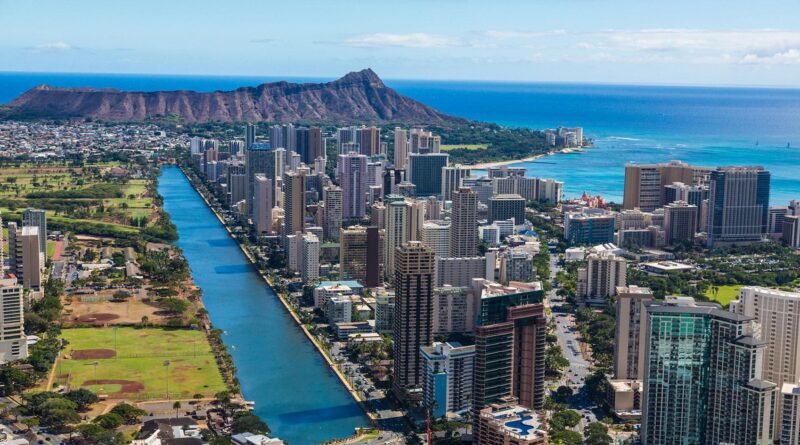History of Honolulu Hawaii
Honolulu, the capital city of Hawaii, is a place of rich history and cultural significance. Situated on the island of Oahu, Honolulu has grown from a small Polynesian settlement to a bustling modern metropolis that serves as a gateway to the Pacific. Its history is a tapestry of indigenous traditions, colonial encounters, and significant geopolitical developments that have shaped the city into what it is today.
Ancient Origins: The Polynesian Settlement
The history of Honolulu begins with the arrival of Polynesians, who were the first to settle the Hawaiian Islands around 1,000 to 1,200 AD. These skilled navigators used the stars, ocean currents, and wind patterns to voyage across the vast Pacific Ocean from places like Tahiti and the Marquesas Islands. Upon their arrival, they established communities across the Hawaiian archipelago, including on the island of Oahu.
The area now known as Honolulu was initially a small settlement. The ancient Hawaiians, or Kanaka Maoli, lived in harmony with the land and the sea, practicing sustainable agriculture, fishing, and aquaculture. The fertile lands around what is now downtown Honolulu were used for growing taro, a staple crop used to make poi, a traditional Hawaiian food.
Honolulu, meaning “sheltered harbor” or “calm port,” was named for its naturally protected harbor, which became an important site for trade and transportation among the islands. The region was also known for its freshwater springs, which provided a vital resource for the early settlers.
The Kingdom of Hawaii: A Center of Power
In the late 18th century, as the islands of Hawaii were unified under a single ruler, Honolulu began to rise in prominence. King Kamehameha I, who unified the Hawaiian Islands after a series of battles, recognized the strategic importance of Honolulu’s harbor. After conquering Oahu in 1795, he established Honolulu as the capital of his newly unified kingdom, moving the capital from the island of Hawaii.
Honolulu quickly became the political, economic, and cultural center of the Kingdom of Hawaii. The harbor facilitated trade with foreign ships, and by the early 19th century, Honolulu had become a key port for whaling ships, traders, and missionaries from Europe and the United States. The influx of foreigners brought new ideas, goods, and technologies, but also introduced diseases that had devastating effects on the native Hawaiian population.
In 1820, the first Christian missionaries arrived in Honolulu, led by Hiram Bingham. These missionaries established schools, churches, and printing presses, and they played a significant role in the cultural transformation of Hawaii. They introduced Western education, promoted the Christian faith, and influenced the adoption of Western laws and customs. The Hawaiian monarchy, particularly King Kamehameha III, who reigned from 1825 to 1854, embraced many of these changes, including the drafting of the Hawaiian Kingdom’s first constitution in 1840.
The Impact of the Sugar Industry
The mid-19th century saw the rise of the sugar industry in Hawaii, which had a profound impact on Honolulu’s development. The fertile lands of Oahu were ideal for sugarcane cultivation, and large plantations were established around the island. The success of the sugar industry attracted immigrants from China, Japan, Portugal, the Philippines, and other parts of the world, leading to a significant increase in Honolulu’s population and the city’s ethnic diversity.
The sugar industry also led to increased political and economic ties between Hawaii and the United States. American businessmen and landowners, many of whom had settled in Honolulu, became powerful figures in Hawaiian society. These individuals played a crucial role in the eventual overthrow of the Hawaiian monarchy.
In 1893, a group of American and European businessmen, with the support of the United States government, orchestrated the overthrow of Queen Liliuokalani, the last reigning monarch of Hawaii. The overthrow led to the establishment of the Republic of Hawaii in 1894, with Honolulu as its capital. The republic was short-lived, as Hawaii was annexed by the United States in 1898, becoming a U.S. territory.
Honolulu in the 20th Century: A Military and Economic Hub
The 20th century brought significant changes to Honolulu, particularly with its strategic importance to the United States. The construction of military bases, including Pearl Harbor, transformed the city into a vital military hub in the Pacific. Pearl Harbor, located just west of Honolulu, became the headquarters of the U.S. Pacific Fleet and played a crucial role during World War II.
The attack on Pearl Harbor on December 7, 1941, by the Japanese Imperial Navy, was a pivotal moment in history that brought the United States into World War II. The attack devastated the U.S. Pacific Fleet, killing over 2,400 Americans and leading to the United States’ declaration of war on Japan. Honolulu and its surrounding areas became heavily militarized during the war, with thousands of soldiers stationed in the city.
After World War II, Honolulu continued to grow as an economic and cultural center in the Pacific. The city experienced rapid urbanization, with new infrastructure, housing developments, and commercial centers being built to accommodate the growing population. The development of Waikiki as a tourist destination in the mid-20th century further boosted Honolulu’s economy, making tourism one of the city’s most important industries.
Hawaii’s admission to the United States as the 50th state in 1959 marked a new era for Honolulu. The city became the state capital and the seat of government for Hawaii, further solidifying its importance in the Pacific region.
Modern Honolulu: A Global City
Today, Honolulu is a vibrant, multicultural city that serves as a major hub for tourism, business, and culture in the Pacific. The city’s economy is driven by tourism, military defense, international business, and research and development, with key industries including hospitality, transportation, and healthcare.
Honolulu’s iconic landmarks, such as Waikiki Beach, Diamond Head, and the USS Arizona Memorial at Pearl Harbor, draw millions of visitors each year. The city is also home to a thriving arts and cultural scene, with institutions like the Honolulu Museum of Art, the Bishop Museum, and the Hawaii Theatre Center offering a glimpse into the rich history and diverse cultures of the islands.
In addition to its role as a global tourist destination, Honolulu is also a center for education and research. The University of Hawaii at Manoa, located in Honolulu, is a leading institution in the fields of oceanography, astronomy, and Pacific studies, contributing to the city’s reputation as a hub for academic and scientific research.
Honolulu’s diverse population, shaped by centuries of immigration and cultural exchange, is reflected in its vibrant food scene, festivals, and community events. The city’s unique blend of Native Hawaiian, Asian, Pacific Islander, and Western influences creates a cultural mosaic that is celebrated and cherished by residents and visitors alike.
The Legacy of Honolulu
As Honolulu continues to grow and evolve, it remains deeply connected to its past. The city’s history as the capital of the Hawaiian Kingdom, its role in the sugar industry, its significance during World War II, and its transformation into a modern metropolis are all integral parts of its identity. Honolulu’s legacy is one of resilience, diversity, and cultural richness, making it a city like no other.
Honolulu’s history is not just a story of the past but a living narrative that continues to shape the city’s present and future. As the capital of Hawaii, Honolulu plays a vital role in the cultural and political life of the state, serving as a bridge between the rich traditions of the past and the dynamic opportunities of the future.
Discover more from City Towner
Subscribe to get the latest posts sent to your email.




